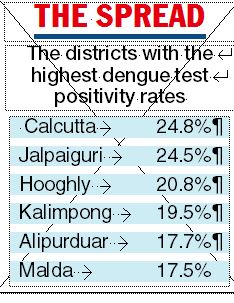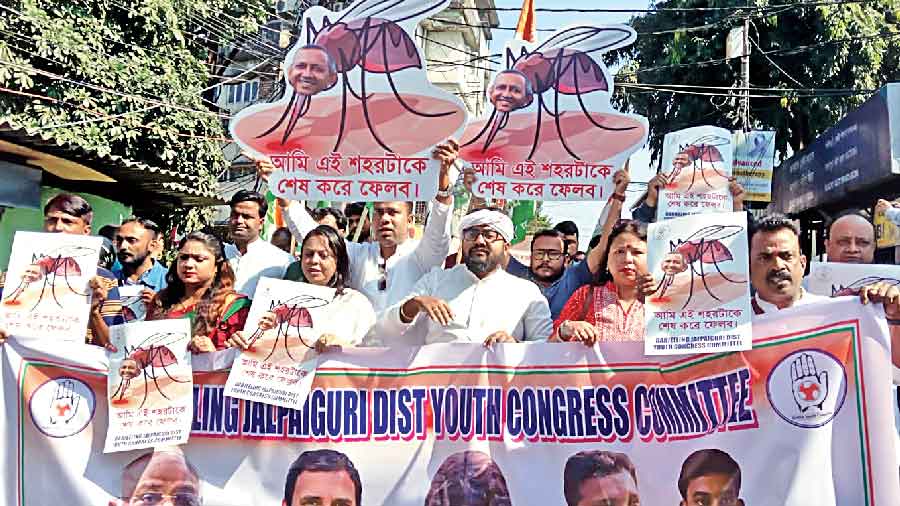The Bengal health department is finding it tough to pull down the dengue positivity rate to under 10 per cent in at least six districts, including Calcutta, because of the paucity of civic and rural workers with the skill to track and destroy mosquito breeding pockets.
Among Bengal districts, the dengue positivity rate this week is the highest in Calcutta, followed by Jalpaiguri, Hooghly, Kalimpong, Alipurduar and Malda. (See chart)
The overall positivity rate in the state this week is 12.7 per cent.
“We are working hard to bring down the dengue positivity rate within a fortnight in at least six districts where the count is high. However, meeting the target has become a challenge as vector-control measures are not up to the mark because of the lack of civic workers with the skill to detect the breeding sources of the dengue-spreading aedes aegypti mosquitoes,” said a senior health official.
The Bengal government has already directed its officials to curb the surge in dengue cases at a time Opposition parties, including the BJP and the Congress, have hit the roads to “showcase the administration’s shortcomings in controlling dengue”.

BJP workers and leaders demonstrate in front of Hooghly’s Serampore Municipality against the slackness in controlling the surge in dengue cases Amit Kumar Karmakar
The Bengal health department is finding it tough to pull down the dengue positivity rate to under 10 per cent in at least six districts, including Calcutta, because of the lack of adequate civic and rural workers with the skill to track and destroy mosquito-breeding pockets.
Among Bengal districts, the dengue positivity rate this week is the highest in Calcutta, followed by Jalpaiguri, Hooghly, Kalimpong, Alipurduar and Malda. (See chart below)
The overall positivity rate in the state is 12.7 per cent.
“We are working hard to bring down the dengue positivity rate within a fortnight in at least six districts where the counts are high. However, meeting the target has become a challenge as vector-control measures are not up to the mark because of the lack of civic workers with the skill to detect the breeding sources of the dengue-causing Aedes aegypti mosquitoes,” said a senior health official.
The Bengal government has directed its officials to curb the surge in dengue cases at a time Opposition parties, including the BJP and the Congress, have hit the streets to “protest the administration’s shortcomings in controlling dengue”.
Sources in the state health department said that during inspections in both urban and rural areas it had been found that mosquito-breeding sources existed at several places in these six districts and that proper preventive measures had not been taken.

“Members of the inspection team spoke to residents and learnt that the staff had sprayed larvicide in bushes and dry places but left pots of stagnant water untreated. This has happened because they are not properly trained about the source of the Aedes aegypti mosquitoes and how they should be tackled,” said a public health official in Calcutta.
“They sprayed larvicide in bushes and dry places as they were asked to kill mosquitoes and not larvae,” he added.
A source at Swasthya Bhavan said the dengue situation was the worst in five years even though the Bengal government annually sanctions Rs 700 crore to fight vector-borne diseases. The health department provides at least half of the allotted money to urban and rural bodies for taking vector-control measures, the source added.
The steady surge in dengue cases across the Siliguri civic area over the past few months and the loss of several lives have prompted Shankar Ghosh, the BJP’s Siliguri MLA, to write to chief minister Mamata Banerjee seeking her intervention in controlling the spread of the vector-borne disease in the city.
He also urged Mamata to send a “competent team” to check the spread of dengue.
“In Siliguri, over 4,000 people have been infected with dengue since January this year and 21 people have lost their lives. The lack of coordination between the district health department and the Siliguri Municipal Corporation has led to the rise in cases,” said Ghosh.











